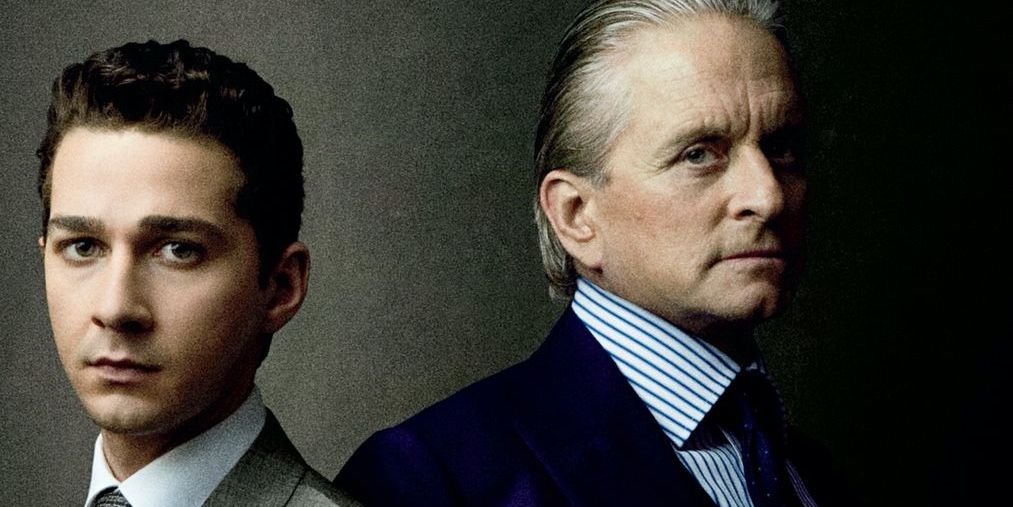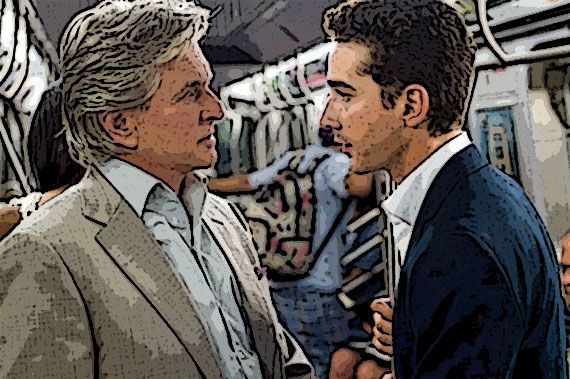Screen Rant's Vic Holtreman reviews Wall Street: Money Never Sleeps
Wall Street: Money Never Sleeps (or just plain old Wall Street 2 if you don't want such a mouthful) is a movie by Oliver Stone that tries to do for the mortgage lending bank meltdown what he did for corporate raiders in 1987 in the original Wall Street. Michael Douglas returns a bit worse for wear after spending almost a decade in prison, and instead of a young Charlie Sheen as the protege we have Shia LeBeouf.
Personality-wise, Shia (Jake Moore) is an analogue to Charlie Sheen's Bud Fox from the first film: Young, aggressive and ambitious - but with a sense of ethics. He's been deeply interested in finance since he was 12 and was mentored by Louis Zabel (Frank Langella), the head of the Wall Street bank for which he works.
Jake is dating Winnie Gekko (Carey Mulligan), who is the estranged daughter of Gordon (Michael Douglas). She's an artistic type who runs a Left wing blog and Jake is a Conservative who's apparently not sold on the idea of evolution. Considering Oliver Stone's political leanings, I'm not sure why he gave Shia's character these attributes, unless it was out of a sense of wanting to be perceived as "fair" by making the hero of the film be from the "other side."
Anyway, Jake is fascinated by Gordon even though Winnie wants nothing to do with him. Even though Gordon has been in prison for many years, Jake is desperate to meet him, against the wishes of his girlfriend. Gordon has a book out in which he warns of the impending financial collapse of the United States due to speculation ("the mother of all evil") and leveraged borrowing. I'm sure there were wise people who saw the bank meltdown coming at the time (the film takes place in 2008), but of course it's easy to impart such deep wisdom to a character in hindsight of the events that have taken place.
Gordon doesn't have much in the way of a bankroll to get back into any sort of investment game, and he seems like he genuinely cares about one thing since having spent all that time in prison: Re-connecting with his daughter. Of course knowing Gordon as we do, we can't help but suspect that he's got something up his sleeve, despite how genuine and convincing he comes across.
Jake is big into green energy and puts most of his time into trying to secure a round of financing for a scientist who is working on a fusion power project ($100 million in financing, to be exact). Despite Winnie's warnings, Jake gets closer and closer to Gordon - with visions of being able to secure that funding to help the scientist and to truly change the world.
Of course everything unravels, and the point is to watch how Jake somehow manages to come back from it while not damaging his relationship with his girlfriend/fiancee.
Honestly, I'm not sure what the point of this movie is. There isn't really an engaging story here (although an attempt is made with Josh Brolin's character as a nemesis to Jake), and it comes across more like some sort of PBS documentary about how exactly the banking crisis came about and why the decisions to bail out the banks were made. We see meetings at the Federal Reserve where the whole thing is laid out - why the banks needed to be bailed out, the catastrophe that would have followed had the first bank collapsed and others followed (worse than the Great Depression!). Frankly this felt like I was being schooled and having explained to me why the bailout was necessary.
There were other odd little touches in the film, including not one, not two but THREE cameos from Oliver Stone (Oliver if you want to be an actor that badly, just go be an actor). During a banquet scene, the camera panned repeatedly across older but attractive women, focusing (without a doubt) on their expensive earrings. If I didn't know better I'd say Stone had an ear fetish, but of course the intent was to show the wretched excess of those evil rich people and their oh-so-overly-expensive jewelry. There were also flashback scenes at key points in the film - placed in such a way to imply that the audience was too dim-witted to recall the significance of a specific reveal, and had to be visually reminded.
Stone tried to spice up the film a bit with his camera work and visual effects - there were some interesting scenes and transitions that were pretty flashy for a movie as dry as this one.
The performances were all good - It was nice to see Shia in a serious dramatic role after the Transformers movies and Indiana Jones 4. Michael Douglas, ALWAYS a pleasure to see on screen - and he stepped right back into the iconic role he played 23 years ago like putting on a pair of comfortable old shoes. Josh Brolin is another actor who excels in every film in which he appears. Carey Mulligan gave the best performance she could despite the way her role unfolded (the very end scene and the point at which she makes a critical decision makes NO sense at all).
Was it a BAD movie? No. It was kind of interesting on an intellectual level and the performances were good - but in the end the best word I can use to describe how Wall Street: Money Never Sleeps left me feeling is... ambivalent.
Wall Street 2 trailer:
[poll id="74"]


